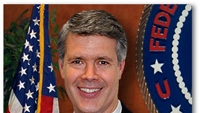Republicans call FCC’s net neutrality action a ‘power grab’

It’s not certain whether the congressional hearings or the lawsuits will come first. But both will surely come before most Americans’ Christmas trees are taken down.
Reps. Fred Upton, R-MI, and Greg Walden, R-OR, said they would summon FCC Chairman Julius Genachowski for hearings on whether the agency has authority to pursue net neutrality rules.
Upton, Walden and Rep. Marsha Blackburn, R-TN, said the FCC’s decision was a “power grab” and that legislation will be introduced to overturn the regulations. Meanwhile, Sen. Kay Bailey Hutchison, R-TX, said she will move to withdraw funds appropriated to the FCC to execute the rules.
“We are going to be exploring every option to reverse this order. This will be one of our first hearings we will embark on in the next Congress,” said Upton, who will be chairman of the House Energy and Commerce Committee, which has jurisdiction over the FCC.
Republicans, including FCC commissioner Robert McDowell, blasted the new rules as an over-reach by an activist federal regulator intent on asserting control over the Internet.
Verizon Communications, the wireless giant, said it was concerned about the scope of the new FCC regulations. “The FCC appears to assert broad authority for sweeping new regulation of broadband wireline and wireless networks and the Internet itself,” said Tom Tauke, Verizon’s executive vice president of public policy. In the long term, Verizon said, “that is harmful to consumers and the nation.”
The FCC’s ability to carry out the rules remains in doubt because of a court ruling in April, said Jeffrey Silva, a senior analyst with Medley Global Advisors. In that case, a federal appeals court said the FCC overstepped its legal authority by sanctioning Comcast for blocking file sharing between users of BitTorrent, a peer-to-peer application.
Get the TV Tech Newsletter
The professional video industry's #1 source for news, trends and product and tech information. Sign up below.
“We regard the decision more as a turning point than an endpoint on net neutrality policy, given questions about the ruling’s legal sustainability as well as unpredictable outcomes associated with FCC enforcement,” Silva said.
Other Internet service providers seemed more satisfied by the FCC decision. Comcast and Time Warner Cable each separately said the FCC had struck a “workable balance,” and AT&T said the compromise appeared “to balance major differences.”
The fact that the rules received support — even the lukewarm variety — from these big businesses should worry consumers, several public interest groups said last week.
“There is a reason that so many giant phone and cable companies are happy, and we are not. These rules are riddled with loopholes,” said Andrew Jay Schwartzman, the policy director for the nonprofit Media Access Project. “They foreshadow years of uncertainty and regulatory confusion, which those carriers will use to their advantage.”
